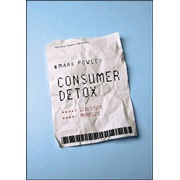How to Consume Less Stuff to Enjoy Life More

Editor's Note: The following is a report on the practical applications of Reverend Mark Powley's recent book, Consumer Detox: Less Stuff, More Life, (Zondervan, 2010).
Advertisers spend billions of dollars each year to try to influence the way you live. They constantly send messages telling you that you won't enjoy life to the fullest if you don't buy their products. But true enjoyment isn't found in what you purchase. It's found in your relationship with God - and God wants you to focus less on consumerism and more on what matters most. Contrary to what the advertisers say, breaking free of consumerism won't give you a smaller life; it will give you a larger vision of how to become the person God made you be.
Here's how you can break the hold of consumerism on your life:
Admit the problem. Acknowledge the damage that consumerism has done to your life. Confess your struggles with consumerism to God, and ask Him to help you break free of it.
Claim the right identity. Don't give in to the pressure of trying to make your life fit the image of what advertisers tell you it should project. Realize that your real identity goes far beyond who you are as a consumer. Your identity is found in nothing less than the fact that you're God's child, connected to Him through Jesus - someone who is loved completely and unconditionally, no matter what you do or don't buy. So don't waste time, energy, or money trying to make a name for yourself or a place for yourself in society through what you purchase. Instead, relax and derive your security from the fact that you have an identity that you can't buy but that can't be shaken by anything.
Realize that you're richer than you know. Living in the western world during the 21st century, you're richer than most people on the planet now, and also richer than most people in history. But you need to understand just how rich you truly are, so you can learn how to appreciate what you have and be satisfied with it - which makes you far less prone to falling for advertisers' schemes to get you to buy more. Spend some time helping people who are actually poor, and let those experiences give you a new perspective on your own life. Thank God often for what He has given you through His grace.
Change from a passive consumer into a critical viewer. Recognize how the advertising you see shapes your desires. The resist it by scrutinizing it, discussing it, disputing it, refusing it, and tuning it out in favor of greater desires - what God wants for you.
Live within limits. Rather than following consumerism's demand that you maximize your life - pursuing whatever you want as much as you can - let yourself be caught up in a purpose that's much bigger than your own self-gratification: sharing with others as God leads you. Although that will require living within limits to have resources available to share, your life will become richer when you do so.
Exit the 24/7 world. It's possible to be a consumer 24 hours a day, 7 days a week, but living like that is exhausting because it goes against the natural rhythm of life that God designed. Take breaks (such as a weekly Sabbath day) regularly to rest and reflect on how to live more creatively.
Be present sometimes and absent at other times. Consumerism keeps you constantly distracted, but God wants you to focus more. Sometimes He calls you to be present with other people, alert to them, alive to what they're saying, and attentive to their needs. Sometimes He calls you to be absent, withdrawing from others for quiet and stillness.
Learn to wait and enjoy. Although advertisers tell you that you need instant gratification to enjoy life, you'll actually appreciate what you have much more - and therefore enjoy it more - when you learn to wait for some of what you want. Pray for patience.
Turn off screens so you can experience more of real life. Cut back on some of the time you devote to sitting in front of some kind of screen - a computer screen, a TV screen, a phone screen, or some other kind of shallow experience - so you won't miss out on the joys of real life. Instead of using a mountain screen saver on your computer, take a real hike in some hills. Rather than just playing music, sing a song or play an instrument yourself. Instead of competing in a video sports game, get outside to a park with real people and play a real game.
Make sure that money isn't an idol for you. Money may be an idol in your life if: you become unhappy when you lose money, you envy the possessions or lifestyle of others, you worry about being poor, you measure people's worth by their income or appearance, or you evaluate most decisions in financial terms. Make whatever sacrifices you need to make to put money in its proper place - far behind God in your life. Devote more time and energy to building your relationship with God than you do to building your bank accounts. Manage your money so it doesn't manage you. Create a budget and stick to it. Pay off debts and avoid incurring new ones. Downsize your possessions - from your home and car, to your clothes and gadgets - so you don't own more than you truly need.
Open your hands. Consumerism pressures you to focus on what you can get, but God calls you to focus on what you can give - because giving is a core part of who God is, and by learning to give, you can grow to become more like Him. Remember God's ultimate gift of salvation through Jesus' sacrifice on the Cross, and let your gratitude for His generosity motivate you to be generous by saying "yes" when He calls you to give. Seek adventures in giving that will help you grow in profound ways, such as making large financial sacrifices to support a certain charity project, fostering a child who needs a home, or donating a kidney or bone marrow to someone who needs a transplant. The more you give, the more God will give to you in spiritual blessings. Then you'll discover that you've matured so much that consumerism no longer has power over you. Remember that your present wealth can't last, but wealth in God's kingdom can't stop flowing - forever.

Reverend Mark Powley is an associate pastor and has spoken and written articles on topics of interest to the emergent generation. He has a BA from the University of Nottingham and a Certificate for Theology Graduates from the University of Oxford. He lives with his wife and three sons in Hammersmith, United Kingdom.
Publication date: December 17, 2010
Originally published December 17, 2010.







